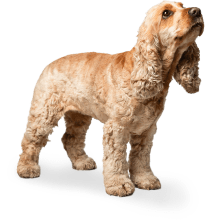

Acupuncture for dogs
 Written by
Dan Wessels
Written by
Dan Wessels
Canine acupuncture is a complementary therapy that involves inserting fine needles into specific pressure points on a dog’s body. It works the same way as it does in us humans, by targeting specific problem areas. The location of those pressure points may be different, but the desired outcome – relief from discomfort – is the same.
If you’re considering acupuncture for an older dogs joint care, or acupuncture has been recommended for your dog’s stiff joints, the first step is to understand how canine acupuncture works. Here, we take a closer look at this treatment and what it can be used for, so that you can make an informed decision for your canine companion.

Acupuncture for dogs: the lowdown
Acupuncture has roots in ancient Chinese medicine and is based on the idea of balancing the body's vital life force, or qi – pronounced chi. This energy flow is considered essential to health, so problems occur when it’s off kilter.
Acupuncture aims to redress the balance by stimulating pressure points around the body, where nerves and blood vessels meet. Very fine needles are applied at these pressure points depending on where the problem is, and this moves energy correctly around the body.
From a traditional medicine point of view, the benefit is thought to come from a variety of factors that promote healing. That includes improving circulation, stimulating both the nervous system and immune system, and releasing the body’s naturally anti-inflammatory hormones.

Acupuncture vs Acupressure
Many people are understandably wary of acupuncture because the technique uses needles, so acupressure is another option to consider. Similar to acupuncture, it involves applying pressure to specific acupuncture points. It’s less invasive and better suited to those dogs – and humans – who aren’t keen on needles. It’s also ideal for locations that are difficult to reach.
The benefits of acupuncture for dogs
Acupuncture for dogs is a complementary therapy, which means it can be used alongside conventional medical treatments to manage symptoms and potentially get faster relief. If your dog is being treated with medicine for extremely stiff joints, for example, acupuncture could work alongside this to help further ease some of the symptoms and promote better mobility.
Some of the most common complaints that canine acupuncture is used to treat include:
- Joint stiffness
- Digestive problems
- Respiratory issues
- Incontinence
The risks of acupuncture for dogs
One of the most frequent questions asked is: does acupuncture hurt my dog? And the answer is, no – acupuncture, done correctly, shouldn’t hurt your dog when the needles are inserted by a trained professional. In fact, your pup might become quite relaxed and even sleepy, although it’s common to experience some slight discomfort or stiffness directly after treatment.
Where to find a qualified canine acupuncturist
Canine acupuncture must only be administered by a fully qualified veterinary acupuncturist, as incorrect treatment can do more harm than good. The Association of British Veterinary Acupuncturists – or ABVA – is a great place to start and has a search function to help you find a professional in your area.

What to expect at a canine acupuncture session
An average canine acupuncture session lasts about half an hour, although you may need to factor in extra time for your first session. Your vet will get your dog comfortable before gently inserting needles into the treatment areas. These may be left in for anything from five minutes to half an hour.
Canine acupuncture sessions are often weekly to begin with, and your vet will gauge how well your dog is responding after each treatment to determine the frequency of sessions. Some dogs show a noticeable improvement in joint stiffness after one treatment, but many will need several sessions to experience relief, and a very small percentage won’t respond to this type of treatment at all.
Your vet will guide you throughout the process and ensure your treatment plan is tailored to your canine companion. If you’re in any doubt at all, rest assured they’ll be happy to advise you on suitability and the likely benefits of acupuncture for your dog.
How YuMOVE Joint Care can help support your dog’s stiff joints
Acupuncture can be an extremely effective way of alleviating your dog’s joint stiffness, but it’s worth remembering you can also try introducing a joint supplement to your dog’s diet. Our high-quality joint supplements for dogs provide a range of Omega-3s that help to soothe stiff joints and support mobility, whether they're young, adult or senior.
Interested in learning about other complementary therapies that can work alongside traditional treatment routes? Read our guide to hydrotherapy for dogs, particularly those with stiff joints.
Previous article
How laser therapy for dogs helps stiff jointsUpcoming article
8 weeks to a healthy mouth




